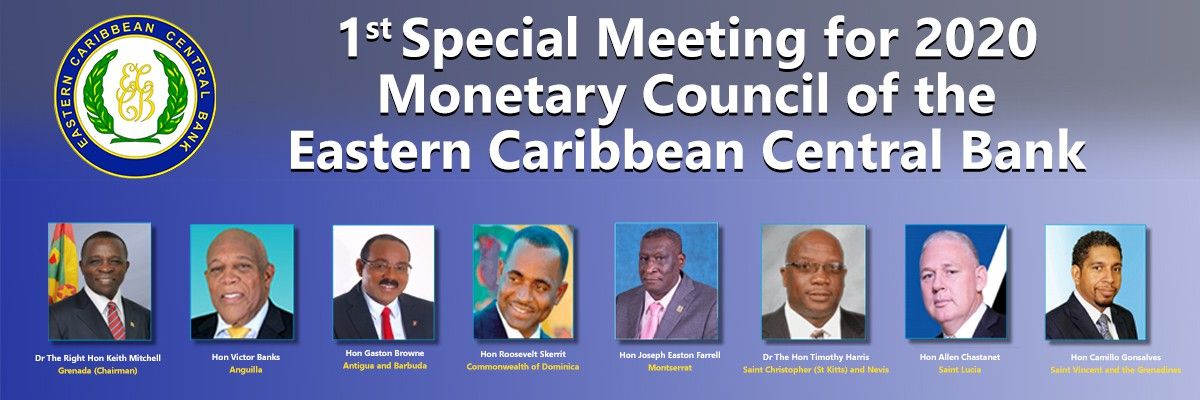Communiqué of the 1st Special Meeting of the Monetary Council of the Eastern Caribbean Central Bank
Eastern Caribbean Central Bank: an Institution of the OECS
The Monetary Council of the Eastern Caribbean Central Bank (ECCB) held its 1st Special Meeting for 2020 on 3 April via videoconference under the chairmanship of Dr The Right Honourable Keith Mitchell, Prime Minister and Minister for Finance, Grenada.
Monetary and Credit Conditions
The Monetary Council received the Governor’s Report on Monetary and Credit Conditions in the Eastern Caribbean Currency Union (ECCU), which focused on managing the response to the COVID-19 pandemic. The Report highlighted the following:
- The outlook for the global economy is dominated by the impact of the evolving COVID-19 pandemic. The IMF predicts a global recession in 2020 of a magnitude equal to or larger than the 2009 recession.
- There has been strong coordinated monetary policy action by Advanced Economies, in recent weeks, to mitigate the economic impact of COVID-19.
- Most ECCB member countries have developed fiscal stimulus/relief packages to counter as far as possible the effects of the COVID-19 pandemic.
- Based on two scenarios, the ECCU is now projected to contract between 4.9 per cent and 6.6 percent in 2020.
- The steady progress by ECCB member countries towards debt sustainability and attaining the target a Debt to GDP Ratio of 60.0 per cent by 2030 will be disrupted.
- The Financing Gap for the ECCU is projected between EC$1.4 billion toEC$2.3 billion. Consequently, member countries strongly support the call to the G20 by the Heads of the IMF and The World Bank Group for a suspension of debt payments for International Development Association (IDA) countries in this period. The proposed treatment for IDA countries should include non-IDA members of the ECCU which are also small, highly open and vulnerable and facing the same pandemic. Furthermore, ECCB member countries are seeking budget support through grants and concessionary financing.
- Exchange rate stability remains firmly entrenched and will continue to serve as an anchor and provide confidence as the Bank responds to COVID-19. As at 27 March 2020, the Backing Ratio stood at 100.7 per cent; notably higher than the statutory requirement of 60.0 per cent.
ECCB’s COVID-19 Response
The Council was apprised of the ECCB’s strategy for COVID-19 response, which is designed to:
- Focus on core mandates as enshrined in the ECCB Agreement: Exchange Rate Stability and Financial Sector Stability.
- Support Member Governments, as far as feasible, in their efforts to mitigate the effects of the pandemic on their economies.
The Council was updated on the measures the ECCB has implemented, to date, as part of its response to COVID-19:
- Provided financial support to Member Governments through a $4.0 million grant from the Fiscal Reserve Tranche II - March 13;
- Reached agreement with the ECCU Bankers Association on a loan repayment moratorium for up to six months. A waiver of late fees and charges would be applicable to eligible customers during that period - March 20;
- Discussed a moratorium with credit unions, Caribbean Confederation of Credit Unions (CCCU) and regulators - March 25;
- Secured the ECCB Board of Directors’ approval for increased government share (75:25 from 60:40) of the fiduciary issue which will facilitate additional credit access - March 27;
- Created a page on the ECCB’s website to provide information on the Bank’s COVID-19 response - March 23; and
- Instituted Bank-wide telecommuting - from March 30.
The Council commended the Bank for these proactive and helpful actions.
Monetary Policy
The Discount Rate is one of the monetary policy tools the ECCB has at its disposal to influence credit conditions. This rate, set at 6.5 per cent (since 2003), refers to the interest rate the ECCB charges on loans to commercial banks and Member Governments.
Cognisant of the far-reaching health, economic, fiscal and financial implications of the COVID-19 pandemic and in the context of the limited fiscal space of ECCB member countries, the Monetary Council, acting on the recommendation of Bank, approved a temporary reduction in the Discount Rate to 2.0 percent from 6.5 per cent, as a means of providing low cost short-term credit, as per section 32 of the ECCB Agreement 1983, as amended.
The ECCB provides a credit allocation to its Member Governments and commercial banks operating in the ECCU at the Discount Rate. The Council noted the adjustment in the proportion of the fiduciary allocation to Member Governments recently approved by the Board of Directors. This adjustment will increase the amount of short-term credit available to member Governments by $138.1m.
Financial Sector Stability
The ECCB is committed to working with Licensed Financial Institutions (LFIs) to protect the stability of the financial sector through the COVID-19 crisis. The ECCB has prepared regulatory guidance for LFIs to help manage the COVID-19 pandemic inclusive of bank closures, customer relief programmes/loan deferrals and contingency liquidity needs.
Attendance
Council Members who participated in the meeting were:
- Dr The Right Honourable Keith Mitchell, Prime Minister and Minister for Finance, Grenada (Chairman);
- The Honourable Victor F Banks, Premier and Minister for Finance, Anguilla;
- The Honourable Gaston Browne, Prime Minister and Minister for Finance, Antigua and Barbuda;
- The Honourable Roosevelt Skerrit, Prime Minister and Minister for Finance, the Commonwealth of Dominica;
- The Honourable Joseph Easton Farrell, Premier and Minister for Finance, Montserrat;
- Dr The Honourable Timothy Harris, Prime Minister and Minister for Finance, Saint Christopher (St Kitts) and Nevis;
- The Honourable Allen Chastanet, Prime Minister and Minister for Finance, Saint Lucia; and
- The Honourable Camillo Gonsalves, Minister for Finance, Saint Vincent and the Grenadines.
Communiqué: 1st Special Meeting of the Monetary Council of the Eastern Caribbean Central Bank
PDF 321 KB
Elizabeth Wayland
OECS Communications Unit
